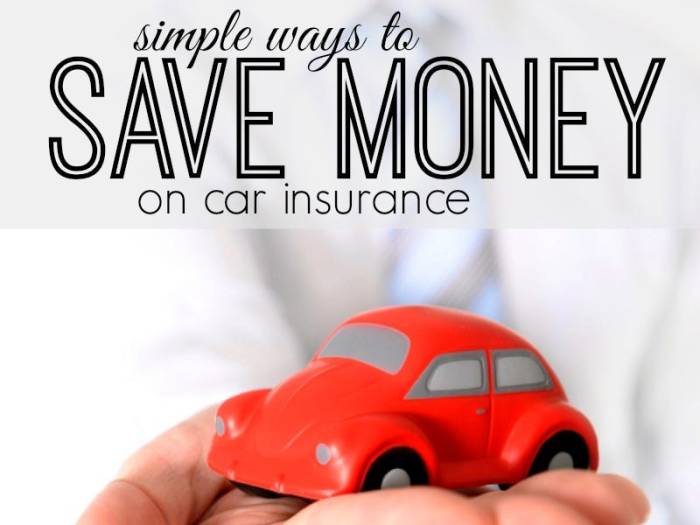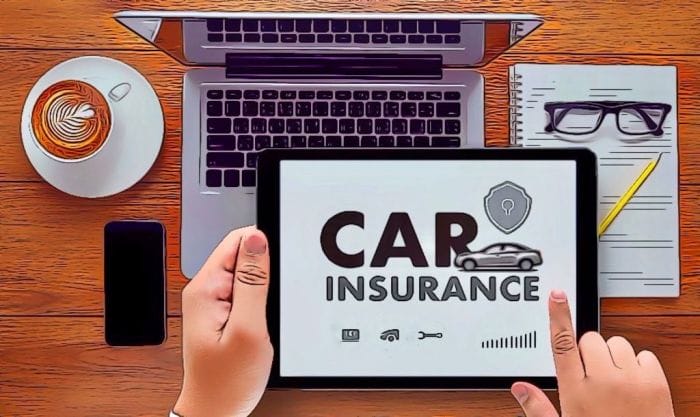Navigating the world of auto insurance can be daunting, especially when it comes to saving money. With rising costs and various factors affecting premiums, it’s essential to be informed and strategic in your approach. In this comprehensive guide, we’ll delve into the intricacies of auto insurance, providing you with valuable tips and insights to help you make informed decisions and secure the best coverage at the most affordable rates.
From understanding coverage options and discounts to utilizing online tools and innovative programs, we’ll equip you with the knowledge and strategies to save money on your auto insurance while maintaining adequate protection. Whether you’re a seasoned driver or a new policyholder, this guide will empower you to navigate the insurance landscape with confidence and make informed choices that align with your budget and insurance needs.
Introduction

Securing auto insurance is a legal requirement for drivers, and the cost of this coverage can vary significantly. Understanding the factors that affect auto insurance premiums can empower you to make informed decisions and potentially save money on your insurance costs.
Several factors influence auto insurance premiums, including your driving history, vehicle type, coverage level, and location. By carefully considering these elements and implementing strategies to mitigate risk, you can potentially lower your insurance premiums.
Driving History
Your driving record plays a crucial role in determining your insurance premiums. Maintaining a clean driving record, free of accidents and violations, can significantly reduce your insurance costs. Conversely, a history of accidents, traffic violations, or DUIs can lead to higher premiums.
- Avoid accidents and traffic violations: The best way to keep your driving record clean is to drive safely and obey traffic laws. Avoiding accidents and violations can help you maintain a low-risk profile, which can lead to lower insurance premiums.
- Complete a defensive driving course: Taking a defensive driving course can help you improve your driving skills and knowledge of traffic laws. Completing a certified course may also result in a discount on your insurance premiums.
Research and Comparison
To secure the most favorable auto insurance rates, conducting thorough research and comparison is imperative. Engage in an exhaustive analysis of the market offerings, evaluating quotes from multiple insurance providers to discern the most cost-effective and suitable policy.
Factors to Consider
When comparing auto insurance quotes, several key factors warrant consideration:
- Coverage: Scrutinize the coverage limits and terms of each policy to ensure they align with your specific needs and preferences.
- Deductible: Assess the deductibles associated with each policy, understanding the trade-off between lower premiums and higher out-of-pocket expenses.
- Discounts: Inquire about potential discounts offered by various insurance companies, such as those for multiple policies, good driving records, or safety features in your vehicle.
- Customer Service: Consider the reputation and customer service record of each insurance provider, ensuring they offer prompt and reliable assistance when needed.
Online Comparison Tools
Harness the power of online comparison tools to expedite and simplify the process of comparing auto insurance quotes. These tools enable you to input your personal and vehicle information once and receive quotes from multiple insurance companies simultaneously.
Leverage these tools judiciously, recognizing that the accuracy and comprehensiveness of the results may vary. Scrutinize the quotes meticulously, ensuring they accurately reflect your coverage needs and preferences.
Understanding Coverage Options
Navigating the world of auto insurance can be overwhelming, especially when it comes to understanding the various coverage options available. Making informed choices about your coverage levels is crucial to ensure adequate protection while keeping your premiums in check. Let’s delve into the different types of coverage, how to select the right levels, and the impact of these choices on your insurance costs.
Types of Auto Insurance Coverage
- Liability Coverage: Covers damages caused to others in an accident, including bodily injury and property damage.
- Collision Coverage: Protects your vehicle from damages resulting from collisions with other objects.
- Comprehensive Coverage: Provides coverage for non-collision-related damages, such as theft, vandalism, and natural disasters.
- Uninsured/Underinsured Motorist Coverage: Protects you in case of an accident with a driver who doesn’t have insurance or doesn’t have enough insurance to cover the damages.
- Medical Payments Coverage: Covers medical expenses for you and your passengers, regardless of who is at fault in an accident.
Choosing the Right Coverage Levels
Selecting the appropriate coverage levels is essential to balance protection and affordability. Here are some factors to consider:
- State Requirements: Every state has minimum liability coverage requirements. Ensure you meet these minimums to comply with the law.
- Vehicle Value: If your car is worth more than the minimum liability limits, consider higher coverage levels to protect your investment.
- Driving Habits: If you frequently drive in high-risk areas or have a history of accidents, you may want to opt for higher coverage limits.
- Personal Financial Situation: If you have substantial assets, you may want to consider higher coverage limits to protect your personal wealth.
Impact of Coverage Choices on Premiums
The coverage options you choose directly impact your insurance premiums. Generally, higher coverage limits and additional coverage types result in higher premiums. However, it’s important to strike a balance between affordability and adequate protection. Consider the following factors:
- Deductible: A higher deductible can lower your premium, but it also means you’ll pay more out-of-pocket if you need to file a claim.
- Discounts: Many insurance companies offer discounts for things like multiple policies, safe driving records, and anti-theft devices. Ask your insurer about available discounts.
- Claims History: A history of accidents or claims can lead to higher premiums.
- Age and Experience: Younger and less experienced drivers typically pay higher premiums.
Discounts and Savings Opportunities

Auto insurance companies offer various discounts to help policyholders save money on their premiums. Taking advantage of these discounts can significantly reduce your insurance costs.
Here are some common discounts and tips for qualifying for them:
Good Driving Record
Maintaining a clean driving record is one of the most effective ways to qualify for discounts. Insurance companies reward drivers with good driving records by offering lower premiums. To maintain a good driving record, avoid traffic violations, accidents, and DUI/DWI convictions.
Multiple Policies
Bundling your auto insurance policy with other policies, such as home or renters insurance, can often lead to discounts. Insurance companies offer this discount because it reduces their administrative costs and increases customer loyalty.
Safety Features
Installing safety features in your vehicle, such as airbags, anti-lock brakes, and anti-theft devices, can also qualify you for discounts. These features reduce the risk of accidents and theft, which makes you a less risky driver in the eyes of insurance companies.
Other Discounts
Other discounts may be available depending on your age, occupation, credit score, and membership in certain organizations. Be sure to ask your insurance company about all the discounts you may be eligible for.
The potential savings from discounts can vary significantly. On average, drivers can save up to 20% on their premiums by taking advantage of available discounts. However, the actual amount you save will depend on the specific discounts you qualify for and the insurance company you choose.
Bundle Insurance
Benefits of Bundling
Bundling insurance involves combining multiple insurance policies, such as auto, home, and renters’ insurance, with the same provider. This practice offers several benefits:
- Convenience: Managing multiple insurance policies with a single provider simplifies the insurance process, requiring less paperwork and fewer interactions with different insurance companies.
- Cost Savings: Bundling insurance often leads to cost savings. Insurance providers frequently offer discounts to customers who purchase multiple policies with them. These discounts can vary but typically range from 5% to 25%. Additionally, bundling insurance can help save money on insurance premiums by allowing policyholders to take advantage of multi-policy discounts.
- Tailored Coverage: Bundling insurance enables policyholders to tailor their coverage to their specific needs. By combining different insurance policies with the same provider, policyholders can ensure that their coverage is comprehensive and meets their unique requirements.
Types of Bundles
- Home and Auto Insurance: Combining home and auto insurance is a common type of bundle. This bundle typically offers discounts of up to 15% on both policies.
- Renters and Auto Insurance: Renters who own vehicles can bundle their renters’ insurance with their auto insurance. This bundle typically offers discounts of up to 10% on both policies.
- Multiple Auto Insurance: Policyholders with multiple vehicles can bundle their auto insurance policies to save money. This bundle typically offers discounts of up to 10% on each policy.
Considerations
When considering bundling insurance, there are a few factors to keep in mind:
- Compare Quotes: Before bundling insurance, it’s essential to compare quotes from multiple insurance providers. This will ensure that you’re getting the best deal on your insurance coverage.
- Read the Fine Print: When bundling insurance, carefully read the fine print of your policies. Make sure you understand the terms and conditions of your coverage and that there are no hidden fees or charges.
- Consider Your Needs: Before bundling insurance, consider your needs and make sure the bundle you choose meets them. Don’t just focus on the cost savings; ensure the coverage is comprehensive and meets your unique requirements.
Increasing Deductible

In auto insurance, the deductible is the amount you pay out of pocket before your insurance company starts covering the costs of a claim. Choosing the right deductible is a balance between saving money on your premiums and having enough coverage to protect yourself financially in case of an accident.
Selecting the Right Deductible
When selecting a deductible, consider your budget and risk tolerance. If you have a tight budget and can afford to pay a higher deductible, you’ll save money on your premiums. However, if you’re worried about being able to afford a large deductible in case of an accident, you may want to choose a lower deductible.
Impact on Insurance Premiums
Generally, the higher your deductible, the lower your insurance premiums. This is because the insurance company is taking on less risk by covering a smaller portion of the claim. However, it’s important to remember that you’ll need to pay the deductible out of pocket before your insurance coverage kicks in.
Maintaining a Good Driving Record
Maintaining a clean driving record is crucial for securing affordable auto insurance premiums. A history free of traffic violations and accidents reflects your responsible driving behavior, reducing the perceived risk to insurance companies. Conversely, a poor driving record can lead to higher premiums or even policy cancellation.
Here are some tips for avoiding traffic violations and accidents:
Practice Defensive Driving
- Stay alert and focused while driving, avoiding distractions like cell phones or excessive conversation.
- Obey speed limits and traffic signs, and be mindful of other drivers’ actions.
- Maintain a safe following distance, allowing ample time to react to sudden stops or changes in traffic conditions.
Regular Vehicle Maintenance
- Keep your vehicle in good working condition through regular maintenance and repairs. Proper maintenance can prevent mechanical failures that may lead to accidents.
- Ensure your tires have adequate tread depth and are properly inflated to enhance traction and control.
- Replace worn or damaged brake pads and rotors promptly to maintain optimal braking performance.
Avoid Driving Under the Influence
- Never operate a vehicle under the influence of alcohol or drugs. Driving while intoxicated is illegal and significantly increases the risk of accidents.
- If you plan to consume alcohol, arrange for a designated driver or use a ride-sharing service.
Maintaining a good driving record can significantly lower your auto insurance premiums. Insurance companies reward responsible drivers with lower rates, recognizing their reduced risk profile. By following these tips, you can protect yourself financially and enjoy peace of mind knowing you are doing your part to make the roads safer.
Taking Advantage of Telematics Programs

Telematics programs are innovative initiatives offered by certain auto insurance companies to monitor driving behavior and provide personalized feedback to policyholders. These programs utilize telematics devices installed in vehicles to collect data on various aspects of driving habits.
Telematics Devices and Data Collection
Telematics devices are small electronic gadgets connected to a vehicle’s diagnostic port. They continuously gather information about driving behavior, including acceleration, braking, speed, and cornering patterns. Some devices also monitor location and mileage. This data is securely transmitted to the insurance company for analysis.
Potential Savings and Benefits
Participating in telematics programs can lead to potential savings on auto insurance premiums. Insurance companies often offer discounts to policyholders who demonstrate safe driving habits based on the data collected. Additionally, telematics programs provide valuable insights into driving behavior, allowing policyholders to identify areas for improvement and adopt safer driving practices.
Utilizing Online Tools and Resources

Navigating the auto insurance market can be overwhelming, but online tools and resources are available to simplify the process and help you save money.
These tools empower you to compare rates, understand coverage options, and identify discounts, all from the comfort of your home.
Online Rate Comparison Tools
Numerous online rate comparison tools allow you to compare quotes from multiple insurance providers simultaneously.
Simply enter your personal and vehicle information, and these tools will generate a list of quotes, enabling you to compare coverage options and rates side by side.
Online Insurance Aggregators
Online insurance aggregators gather quotes from various insurance companies and present them in a user-friendly format, making it easy to compare coverage and pricing.
These platforms often provide additional information, such as company ratings and reviews, to help you make an informed decision.
Insurance Company Websites
Many insurance companies have user-friendly websites that allow you to get quotes, understand coverage options, and purchase a policy online.
These websites often provide detailed information about coverage options, discounts, and other features, enabling you to make an informed decision.
Considering Usage-Based Insurance
Usage-based insurance (UBI) or pay-per-mile insurance is a type of auto insurance that bases premiums on how much a driver uses their vehicle. UBI programs typically track driving habits through a device installed in the vehicle or through a smartphone app.
Some examples of UBI programs include:
- Allstate Drivewise
- Progressive Snapshot
- State Farm Drive Safe & Save
These programs track driving habits such as mileage, hard braking, rapid acceleration, and nighttime driving. Drivers who drive less or have safer driving habits may be eligible for lower premiums.
Potential Savings and Benefits of UBI
UBI can be a good option for low-mileage drivers who want to save money on their auto insurance. According to the Insurance Information Institute, drivers who enroll in UBI programs can save an average of 20% on their premiums. In some cases, drivers may be able to save even more.
In addition to potential savings, UBI programs can also provide drivers with feedback on their driving habits, which can help them become safer drivers.
Conclusion

In the ever-changing world of auto insurance, staying informed and proactive is key to saving money and securing the best coverage. By following the tips Artikeld in this guide, you can take control of your insurance costs and make informed decisions that align with your budget and risk tolerance.
Remember, the insurance market is competitive, and there are numerous opportunities to find affordable rates without compromising on coverage. By shopping around, comparing quotes, and utilizing available discounts and programs, you can unlock significant savings and enjoy peace of mind knowing that you’re adequately protected on the road.
Questions and Answers
Q: How can I find the best auto insurance rates?
A: Comparison shopping is crucial. Obtain quotes from multiple insurance companies and compare them side-by-side to find the most competitive rates.
Q: What factors affect my auto insurance premiums?
A: Your driving history, age, location, type of vehicle, and coverage level all play a role in determining your insurance rates.
Q: Can I save money by bundling my auto insurance with other policies?
A: Yes, bundling your auto insurance with other policies, such as home or renters insurance, can often lead to significant savings.
Q: How does my deductible impact my insurance premiums?
A: Choosing a higher deductible can lower your insurance premiums, but it also means you’ll pay more out-of-pocket in the event of a claim.
Q: What are telematics programs, and how can they save me money?
A: Telematics programs track your driving behavior and offer discounts for safe driving habits. These programs can be a great way to save money if you’re a low-mileage or safe driver.



